#spartacist uprising
Text
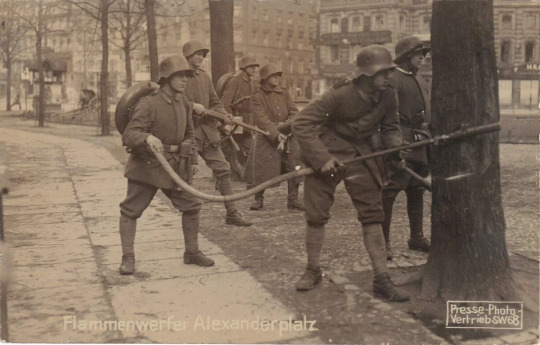
Freikorps equipped with a flamethrower during the Spartacist uprising, Alexanderplatz, Berlin, January 1919
20 notes
·
View notes
Text



January 15, 1919: Comrades Rosa Luxemburg and Karl Liebknecht, leaders of the revolutionary Spartacus League during World War I and founding members of the Communist Party of Germany, are murdered.
The militarist right-wing Freikorps and the opportunist Social-Democratic government of Ebert and Noske collaborated in plotting their arrest and assassination as part of their effort to crush the revolutionary struggle known as the Spartacist Uprising (January 4-15, 1919).
------
“Order prevails in Berlin!” You foolish lackeys! Your “order” is built on sand. Tomorrow the revolution will “rise up again, clashing its weapons,” and to your horror it will proclaim with trumpets blazing: I was, I am, I shall be!
- From Luxemburg's last known article, written hours before her arrest and murder
https://www.marxists.org/archive/luxemburg/1919/01/14.htm
68 notes
·
View notes
Photo
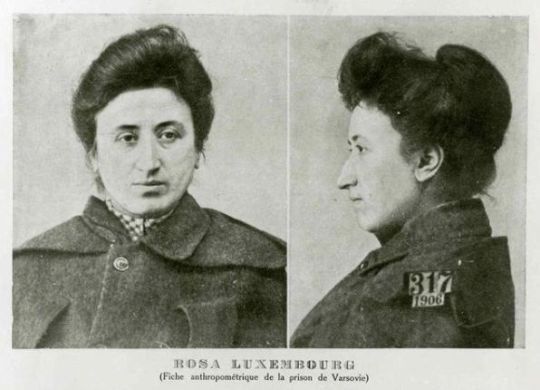
On this day, 5 March 1871, the revolutionary socialist of Polish-Jewish descent Rosa Luxemburg was born. Splitting from the Social Democrats (SPD) when they supported World War I, she co-founded the Spartacus League, which later renamed itself the Communist Party of Germany (KPD), and enthusiastically took part in the German revolution of 1918. Luxemburg was a critic both of the "ultra-centralism" of Russian Bolshevik Vladimir Lenin, and also of reformist socialists, declaring: “People who pronounce themselves in over of the method of legislative reform in place of and in contradistinction to the conquest of political power and social revolution, do not really choose a more tranquil, calmer and slower road to the same goal, but a different goal. Instead of taking a stand for the establishment of a new society they take a stand for surface modifications of the old society... Our program becomes not the realization of socialism, but the reform of capitalism not the suppression of the system of wage labor, but the diminution of exploitation, that is, the suppression of the abuses of capitalism instead of the suppression of capitalism itself.” Luxemburg and her colleague Karl Liebknecht were later murdered by the right-wing paramilitary Freikorps acting on behalf of the SPD in the wake of the failed Spartacist uprising of 1919. More: https://stories.workingclasshistory.com/article/10545/birth-of-rosa-luxemburg https://www.facebook.com/workingclasshistory/photos/a.1819457841572691/2223680981150373/?type=3
228 notes
·
View notes
Text

On this day, Polish and naturalised-German Marxist revolutionary, Rosa Luxemburg was born! She co-founded the Spartacus League which became the Communist Party of Germany. She was a key figure in the 1919 Spartacist uprising and was later jailed and executed in response.
29 notes
·
View notes
Note
Would the History and politics of the real world affect the story of this Ponyville? i.e. the Spartacist uprising/Bolshevik Revolution along with the First Red Scare or would those events be fictionalized around the ponies and Equestria?
If it serves the story.
35 notes
·
View notes
Text
The Counter-revolutionaries are running and propagandizing against us everywhere, beat them! Beat them to death where you find them! If the counter-revolution succeeds even for an hour, they won't spare a single proletarian. Before they can drown our revolution in blood, you must drown them in their own blood!
— Tibor Szamuely (People's Commissar), Vörös Újság (RED NEWS), 11 February 1919.

Tibor Szamuely, directly to Lenin's left, meeting with Vladimir Lenin in Moscow before being sent to Germany to participate in the Spartacist uprising and later the Hungarian Revolution of 1919 becoming the leader of the Lenin Boys, a paramilitary group that served as the armed wing of the Party of Communists in Hungary during their short lived rule as the Hungarian Soviet Republic.
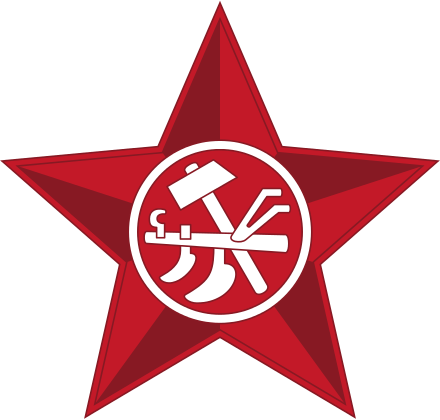
The emblem of the Party of Communists in Hungary
#quotes#Hungary#Hungarian Soviet Republic#armed struggle#counter-revolution#Lenin#Lenin boys#Tibor Szamuely
23 notes
·
View notes
Note
Gonna be honest. I often find myself blaming everything on the German Social Democratic Party. Like if they had just voted against the war credits and became an illegal party like the Bolsheviks we could be living under communism right now. And again siding against the Spartacist uprising allowing the Freikorps to murder the revolutionaries and set the stage for nazism. They acted in the worst possible ways in at least 2 of the most decisive moments in communist history.
people like to say oh the soviets were responsible for hitler because they wouldnt side with the socdems and yeah the third period was stupid but also like even if the communists did want to side with the socdems how do we know they wouldve accepted.
blaming every problem on the germans is a good idea tho
9 notes
·
View notes
Text

On January 12, 1919, the Spartacist Uprising of German workers was violently crushed by the Freikorps, the right-wing militia groups deployed by the government, led by the SDP.
In the photo, a young German worker stands proudly in front of the firing squad.
0 notes
Text
Events 1.15 (before 1940)
69 – Otho seizes power in Rome, proclaiming himself Emperor of Rome, beginning a reign of only three months.
1541 – King Francis I of France gives Jean-François Roberval a commission to settle the province of New France (Canada) and provide for the spread of the "Holy Catholic faith".
1559 – Elizabeth I is crowned Queen of England and Ireland in Westminster Abbey, London.
1582 – Truce of Yam-Zapolsky: Russia cedes Livonia to the Polish–Lithuanian Commonwealth.
1759 – The British Museum opens to the public.
1777 – American Revolutionary War: New Connecticut (present-day Vermont) declares its independence.
1782 – Superintendent of Finance Robert Morris addresses the U.S. Congress to recommend establishment of a national mint and decimal coinage.
1815 – War of 1812: American frigate USS President, commanded by Commodore Stephen Decatur, is captured by a squadron of four British frigates.
1818 – A paper by David Brewster is read to the Royal Society, belatedly announcing his discovery of what we now call the biaxial class of doubly-refracting crystals. On the same day, Augustin-Jean Fresnel signs a "supplement" (submitted four days later) on reflection of polarized light.
1822 – Greek War of Independence: Demetrios Ypsilantis is elected president of the legislative assembly.
1865 – American Civil War: Fort Fisher in North Carolina falls to the Union, thus cutting off the last major seaport of the Confederacy.
1867 – Forty people die when ice covering the boating lake at Regent's Park, London, collapses.
1870 – A political cartoon for the first time symbolizes the Democratic Party with a donkey ("A Live Jackass Kicking a Dead Lion" by Thomas Nast for Harper's Weekly).
1876 – The first newspaper in Afrikaans, Die Afrikaanse Patriot, is published in Paarl.
1889 – The Coca-Cola Company, then known as the Pemberton Medicine Company, is incorporated in Atlanta.
1892 – James Naismith publishes the rules of basketball.
1908 – The Alpha Kappa Alpha sorority becomes the first Greek-letter organization founded and established by African American college women.
1910 – Construction ends on the Buffalo Bill Dam in Wyoming, United States, which was the highest dam in the world at the time, at 99 m (325 ft).
1911 – Palestinian Arabic-language Falastin newspaper founded.
1919 – Rosa Luxemburg and Karl Liebknecht, two of the most prominent communists in Germany, are clubbed and then shot to death by members of the Freikorps at the end of the Spartacist uprising.
1919 – Great Molasses Flood: A wave of molasses released from an exploding storage tank sweeps through Boston, Massachusetts, killing 21 and injuring 150.
1934 – The 8.0 Mw Nepal–Bihar earthquake strikes Nepal and Bihar with a maximum Mercalli intensity of XI (Extreme), killing an estimated 6,000–10,700 people.
1936 – The first building to be completely covered in glass, built for the Owens-Illinois Glass Company, is completed in Toledo, Ohio.
1937 – Spanish Civil War: Nationalists and Republicans both withdraw after suffering heavy losses, ending the Second Battle of the Corunna Road.
0 notes
Text
Rosa Luxemburg’s favorite spots in Berlin

Rosa Luxemburg stands in front of a legendary café in Berlin, Café Einstein.
Grüß Gott, comrades! We begin our journey at Café Einstein, a hallowed ground for intellectuals and radicals. In this very café, I've had spirited discussions with fellow revolutionaries like Karl Liebknecht. Here, we debated the necessity of a united front against the ruling class.
She gestures to a corner table.
This table right here—it's where we passionately discussed the implications of imperialism and the global proletariat's struggle. The aroma of coffee mixed with revolutionary fervor is unforgettable. It was in this very café where I penned some of my most influential essays, including "The Accumulation of Capital."
She leads the way to Gendarmenmarkt, a beautiful square.
Now, let's stroll over to Gendarmenmarkt, where I often found solace and inspiration. This square is steeped in history, and it's where I contemplated the significance of art in our revolutionary movement.
She stands in front of the Konzerthaus.
Right here stands the Konzerthaus. I attended concerts here, and it was a source of cultural enrichment. I firmly believed that a true revolution needed to embrace not only political change but also the liberation of the human spirit through art and culture. In fact, I once remarked to Clara Zetkin, "Art is the soul of the revolution."
She leads the way to the infamous Clärchens Ballhaus.
Now, brace yourselves for a bit of fun. Clärchens Ballhaus—this is where we celebrated life amidst the tumultuous times. In 1919, after the Spartacist Uprising, we held a grand party here. Karl and I danced the night away, proving that even in the midst of revolution, joy is a revolutionary act.
She steps inside Clärchens Ballhaus.
History isn't all seriousness, my friends. It's also about cherishing moments of joy and unity. And here at Clärchens, we danced not only for ourselves but for the hope of a brighter future.
She leads the way to a historic restaurant: “ Zur Letzten Instanz”.
Lastly, we've arrived at Zur Letzten Instanz, one of the oldest restaurants in Berlin. Here, we dined with friends, including Clara Zetkin and Franz Mehring. We discussed the complexities of class struggle over a hearty meal.
She enters the restaurant.
At this table, we debated the necessity of revolution and the role of the proletariat in shaping the future. Our discussions here influenced our political ideologies and actions. It was in these very walls that I once declared, "Freedom is always and exclusively freedom for the one who thinks differently."
She raises her glass.
To Berlin, a city that has witnessed our dreams, struggles, and triumphs.
She smiles warmly and takes a sip.
Prost!
0 notes
Text
The rise and fall of the Weimar Republic
youtube
The fall of the German empire
THE FIRST REVOLUTION 'from above' - October 1918
Germany became a parliamentary monarchy (2 Oct) with Prince Max of Baden as Chancellor - an attempt to preserve the monarchy.
Germany STRUGGLED and were desperate for peace - the average German survived on only 1000 calories daily in the last months of 1918, 2m soldiers had died in the war, 5m soldiers were wounded or disabled.
THE SECOND REVOLUTION 'from below' - November 1918
Economic struggles led to political upheaval.
Began with the naval mutiny in Kiell 28 Oct 1918 where the sailors refused to leave port for a final attack on the British navy, took control of the harbour and raised the communist flag on their ships.

Workers' and soldiers' councils were established and strikes, mutinies and left-wing uprisings followed. Prince Max of Baden was unable to restore order. The SPD began to fear that further uprisings would leave Germany vulnerable to invasion by its enemies. Kaiser Wilhelm II refused to abdicate in favour of one of his sons and so on 9 Nov, Philipp Scheidemann (an SPD leader) proclaimed the end of the monarchy and the establishment of the Weimar republic from from the Reichstag building. Prince Max announced the Kaiser's abdication (without Wilhelm's agreement) and transferred political authority to Friedrich Ebert, making the new political regime seem more formal and legitimate.
Initial challenges (1918-1923)
- a period of instability and crisis during which the republic was struggling to survive.
POLITICAL ISSUES
The parliamentary system of the Weimar constitution had weaknesses. It was based on a system of proportional representation so that all political parties would have fair representation. HOWEVER, there were so many different groups that no party could win a majority, making coalitions inevitable - these were unstable and ineffective, making them reliant on Presidential emergency powers.
Article 48 - gave the President the power to act without parliament's approval in an emergency, but since 'emergency' was not clearly defined, the power was overused and German confidence in democracy was weakened.
SOCIO-POLITICAL ISSUES
The Spartacist uprising (Jan 1919): Communists, led by Karl Liebknecht and Rosa Luxemburg, tried to seize power. The spartacists were defeated when the government accepted the help of the Freikorps (independent regiments raised by anti-communist ex-army officers). The Freikorps brutally crushed the uprising and clubbed Liebknecht and Luxemburg to death. A sign of government weakness that that it had to depend on private forces. Later, in March, the remaining German communists attempted another takeover that was also crushed by the Freikorps and army.

The Kapp Putsch (March 1920): The government began disbanding some Freikorps units in accordance with the Treaty of Versailles. They refused and declared a new government with Wolfgang Kapp as Chancellour. The Weimar government was forced to withdraw to Dresden. The army refused to crush the putsch, the army commander saying 'troops do not fire on troops'. The Weimar government called on the workers of Berlin to begin a strike, which paralysed the capital - transport, power and water supplies were cut off. The putsch collapsed within four days.

A series of political assassinations: mainly carried out by ex-Freikorps members, victims of which include the Jewish Foreign Minister Rathenau and the leader of the armistice delegation Erzberger. Due to right-wing parties' sympathy with the criminals and the tendency of anti-Weimar sentiments in the legal professions, the criminals were let off lightly and the government was powerless to do anything about it.
Throughout Germany, the legal and teaching professions, the civil service and the Reicswehr (army) tended to be anti-Weimar, which was a crippling handicap for the republic.
In the following election, there was a move away from the moderate centre-left parties( that had previously dominated the republic) to extreme groups - left and right. The SPD was forced to form a coalition with the righ-wing German People's party (DVP) and the German democratic party (DDP).
Eight changes of government in the following four years made people lose confidence in the government as well as leaving it vulnerable to attacks from political opponents.

The Beer Hall Putsch (1923): A failed coup d'etat by the Nazi party leader Adolf Hitler, the SA and General Ludendorff in Munich, Bavaria. 2000 members of the SA marched through Munic, copying Mussolini's march on Rome. The police easily broke up Hitler's march and the putsch fizzled out. Hitler was sentenced to five years in prison but only served for nine months (Bavarian sympathy for his aims). The putsch was badly planned and executed. The nazi party was banned, but it succeeded in bringing Nazi ideology to national attention.

Hitler's trial: worked wonders for Nazi propaganda. He moderated his tone and centered his defence on his selfless devotion to the good of the people and the need for bold action to save them. His speech was extensively covered in the newspapers the next day.
David King: "The trial [only] covered Hitler's high treason, and so crimes like attacking the Jews, or storming the [Jewish] printing press just didn't get coverage in the trial."
Even if some liberal media condemned the trial as a grace miscarriage of justice, the sensational headlines and extensive coverage the trial received gave Hitler a much larger and more promintent audience than he had ever known.
ECONOMIC ISSUES
In 1919, Germany was close to bankruptcy due to the enormous cost of the war - lasted longer than anticipated - a war of attrition. The link between paper money and gold reserves was abandoned to put more money into circulation. The mark was worth less than 20% of its prewar value.
The coal mines of the Saar were passed to the League of Nations to be run for the benefit of the French for 15 years, and Germany had to supply free coal to France, Belgium and Italy. 90% of the German merchant fleet was surrendered to the Allies. Russian reparations ended.
The Reparations: a total of 132 billion gold mark - 2 billion marks paid every year and 26% of the value of any goods Germany exported.
Were the economic problems and the hyperinflation that developed in 1923 mainly caused by unrealistic reparations demands?
Louis Snyder: reparations were a main reason for Germany's economic crisis.
Geoff Layton: the crisis was caused by long-term inefficiencies in the German economy, which were made worse by reparations.
The Ruhr Invasion: the French concluded in January 1923 that Germany had deliberately defaulted on the coal deliveries it was required to make to France and Belgium. Two days later, French and Belgian troops moved into the Ruhr to seize goods from factories and mines as payment. The German government ordered the workers to follow a policy of passive resistance since Germany was unable to fight back. The German workers, with the promise of strike payments, refused to cooperate with the French. Paramilitaries blew up railways, sank barges and destroyed bridges. The French failed in their aim.
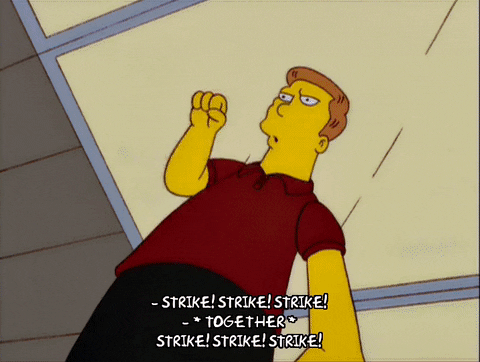
To meet the demand for strike pay, the government printed more money. The German economy had catastrophic levels of inflation as a result, and due to shortages of goods and the worthlessness of money, it became a barter economy.
Marks required in exchange for £1:
November 1918: 20
February 1922: 1,000
November 1923: 21,000,000,000

"Golden Era" under Stresemann (1924-1929)
ECONOMICS
Called off the passive resistance in the Ruhr, reduced government expenditure and promised to start making reparations payments again.
In November 1923, the Rentenmark (one rentenmark = 1 trillion gold marks) was introduced as a temporary currency. The financial situation stabilised.
The working classes had been badly hit as their wages failed to keep pace with inflation. The middle classes and small capitalists lost their savings - many looked towards the Nazis for improvement. Landowners and industrialists, however, came out of the crisis well as they still owned their material wealth, which strengthened their control of big business over the German economy.
Some historians: The inflation was deliberately engineered by wealthy capitalists to gain greater control over the economy. - impossible to prove.
The Dawes plan: provided an immediate loan of 800 million mark from the USA. Relaxed the fixed reparations payments - Germany could pay what it could afford - and no actions would be taken in the event of non-payment without consultation. Reichsmark, backed up by gold reserves, replaced the rentenmark.
Bitterly opposed by right-wing (DNVP & Nazis...) groups that wanted Germany to stop paying reparations altogether.
The French withdrew from the Ruhr in 1924 and relations between France and Germany improved as Germany began payments again.
Industry:
In 1923, industrial output had reached prewar levels, but from 1924, the economy grew rapidly, exports increasing by 40% between 1925 and 1929. Production became more efficient as old machinery was replaced by new.
Inflation rate dropped to almost sero from 1924. Real wages began to increase and living standards imrpoved. Improved infrastructure built with foreign capital.
SOCIAL
New welfare schemes were developed in keeping with the Weimar constitution.
The Public Assistance Programme 1924
The Accident Insurance Programme reformed 1925
The National Unemployment Insurance Programme 1927: extended social insurance to provide relief payments to 17 million workers.
Welfare measures helped raise the standards of living for factory and industrial workers.
Effect?
By the end of the 1920s, there were signs that the economy was slowing down. 1926: balance of trade moved into deficit.
Kurt Borchordt: Germany was living beyond its means. Government spending to compensate those who had lost savings under the hyperinflation, placed a burden on state finances, as well as keeping taxes high. Blames working-class greed for the 'sick economy'
Carl-Ludwig Holtfrerich: much of the responsibility lay with the industrialists, whose cartels reduced healthy competition and who relied on government subsidies rather than reinvesting their profits.
The prosperity did not extend to everyone - farming communities, rural areas. By 1927 and 1928, farmers were seeing little return on the cost of running their farms, but still faced high tax demands, rents or interest payments on mortgages. The wealthy middle- and upper-class were also taxed heavily for government revenue to support the welfare systems.
THE GOLDEN AGE OF CULTURE
Through the 1920s, there was a wave of new cultural achievements.
Bauhaus architectural movement: functional architecture that shunned embellishment. Made use of geometric shapes and focused on affordability, practicality and consistency with mass production, in addition to combining the crafts and fine arts.

FOREIGN POLICY
The Treaty of Locarno 1925: Confirmed Germany's acceptance of its western borders. All countries decided to renounce the use of invasion and force, except in self-defence - prevented another Ruhr invasion.
Improved relations between European countries up until 1930. The spirit of Locarno: the belief that there would be peaceful settlements to any disputes in the future.
Gernaby became a permanent member of the League of Nations in 1926. However, Stresemann used LoN as a platform to air German grievances: ethnic Germans living under foreign rule, the failure of other nations to disarm....
The Treaty of Berlin 1926: reassured the USSR of Germany's commitment to good relations. Helped Stresemann win the trust of the army.
Kellogg-Briand Pact 1928: 62 countries signed the agreement that committed its signatories to settling disputes between them peacefully.
The Young Plan 1929: Stresemann persuaded the USA to re-examine the reparations issue. Reduced the total reparations sum from 132 billion marks to 37 billion marks. Included a 59-year payback period, the end of Allied supervision of German banking, and provision of any disputes to be settled at the International Court of Justice.
The right wing objected (again) to Germany paying any reparations at all, even the reduced sum agreed by the Young plan. DNVP and Nazi party.

LONG-TERM AIMS OF STRESEMANN: Revision of The Treaty of Versailles.
Perspectives on Stresemann:
Jonathan Wright: Stresemann=a hypocrite who secured European trust, US money and protection from French invasion, in order to leave open the opportunity for a revision of Germany's eastern borders.
A.J.Nicholls: "It is unlikely that the French or British politicians really imagined Stresemann had changed [from his nationalist views]. They knew the German foreign minister was a tough negotiatior, well able to defend the interests of his country."
POLITICAL STABILITY 1924-1929
Political developments: much greater political stability. More than 50% of people voted for republican parties in May 1924, rising to 60% in a second election in December 1924.
The republican vote increased:
May 1924: more than 50% December: nearly 60%
The extremist vote declined:
Nazis: May 1924: 6.5% December 1924: 3%
KPD: May 1924: 12.6% December 1924: 9%
Greater cooperation amongst parties: DNVP with the republicans.
The election of Paul von Hindenburg, a respected conservative monarchist, as president encouraged the poltical right to accept the republic.
HOWEVER, the coalitions were fragile.
The Crisis Years and The Rise of Hitler
The Crisis Years:
The prosperity under Stresemann was much more dependent on US loans than most people realised. When the USA, due to theWall Street Crash oct 1929, was forced to stop the loans and began to call in many short-term loans already made to Germany. This caused a crisis of confidence in the currency and led to a run on the banks, many of which had to close. The industrial boom had led to worldwide over-production, but now exports were severely reduced, resulting in the closing of factories, and ultimately unemployment. Mid-1931: Unemployment nearly 4 million. By this point, Stresemann had died of a heart attack.
The government of Chancellor Brunning (CCP) reduced government spending, introduced high tariffs to help German farmers, and bought shares in factories hit by the slump. HOWEVER, these measures were not efficient enough. Unemployment continued to rise. Spring 1932: 6 million unemployed. The government was criticised by almost all of society, especially industrialists and the working class who demanded more decisive action. The republic lost much of the working-class support because of the increasing unemployment and reduction in unemployment benefits.
0 notes
Photo
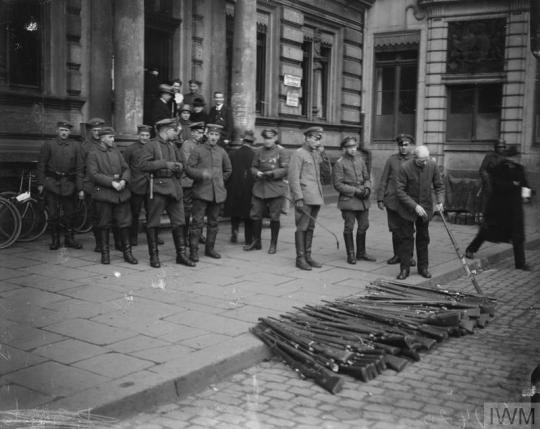


Feb 2 1919 Near Dusseldorf, John Warwick Brooke takes these photos of Freikorps brought to Dusseldorf to suppress the Spartacists. On the ground is a pile of rifles taken from the Spartacists.
February 2 1919-02-02
IWM Q 7419, IWM Q 7420, IWM Q 7421
23 notes
·
View notes
Quote
The danger of the dictatorship of the left was precisely that accusation that the majority socialists in power were throwing at us [anarchists]. Perhaps we have to confess that they saw the future more clearly than we who were mixed up with the Spartacists, and the other supposed revolutionaries, in spite of the fact that they demonstrated themselves to be such cowards and traitors? These are the questions that we can’t avoid asking ourselves if we are not afraid of the truth. They are hard things to confess to one’s self. They are errors that many anarchists are committing right now in associating with the communists in agitations and social conflicts. And these comrades don’t have the excuse of ignorance about the reactionary and bloodthirsty character of communism as it was in our case toward the end of 1918. Today the counterrevolutionary actions of the communists are well known by everyone who wants to be informed. Then, we were ignorant of everything about them for lack of communication with Russia. So much duplicity and barbarism in them we could not even have dreamed of.
Enrico Arrigoni
4 notes
·
View notes
Photo

"Those who do not move do not notice their chains"
Rosa Luxemburg
100 years ago, following the Spartacist uprising, Rosa was murdered in Berlin on the 15th of January 1919 by paramilitary forces commanded by the German Social Democrats.
#rosa luxemburg#rosa#spartacist uprising#mural#graff#graffiti#street art#streetart#rosaluxemburg#berlin#marxism#marxist#marxists#socialism#communist#libertarian communism#communism#socialist#spd#social democrats
375 notes
·
View notes
